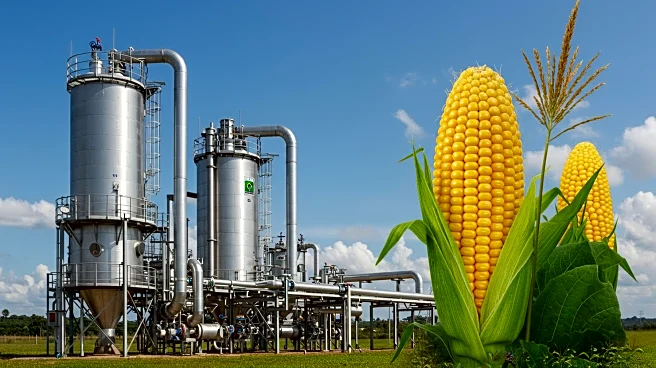What's Happening?
Cargill's Brazil unit has announced plans to build a new corn ethanol plant adjacent to its existing sugarcane facility in Goias, Brazil. This move is part of Cargill's strategy to expand its biofuel production capabilities in Brazil, a key player in the global grains market. The company already produces ethanol from both sugarcane and corn in the region. Earlier this year, Cargill acquired a 50% stake in SJC Bioenergia, gaining control over assets in Quirinopolis and Cachoeira Dourada, Goias. The new plant represents a significant investment in the bioenergy sector, although specific details about the project have not been disclosed.
Why It's Important?
Cargill's expansion into corn ethanol production in Brazil underscores the growing importance of biofuels in the global energy market. As countries seek to reduce carbon emissions and transition to renewable energy sources, biofuels like ethanol play a crucial role. This development could enhance Brazil's position as a leading biofuel producer, potentially influencing global energy markets and trade dynamics. For Cargill, the new plant represents an opportunity to diversify its energy portfolio and capitalize on Brazil's agricultural strengths. The move may also impact U.S. biofuel markets, as increased production in Brazil could affect supply and pricing.
What's Next?
Cargill's continued investment in biofuel infrastructure suggests a long-term commitment to expanding its presence in the renewable energy sector. The company may explore further acquisitions or partnerships to enhance its production capabilities. As the new plant becomes operational, stakeholders will monitor its impact on local economies and employment. Additionally, regulatory developments in Brazil regarding biofuel production and environmental standards could influence the project's trajectory.
Beyond the Headlines
The expansion of biofuel production raises questions about land use and sustainability, particularly in regions like Goias where agriculture is a major economic driver. The balance between food production and energy crops is a critical consideration, as is the environmental impact of increased ethanol production. Cargill's investment may also prompt discussions on the role of multinational corporations in shaping energy policies and practices in developing countries.









